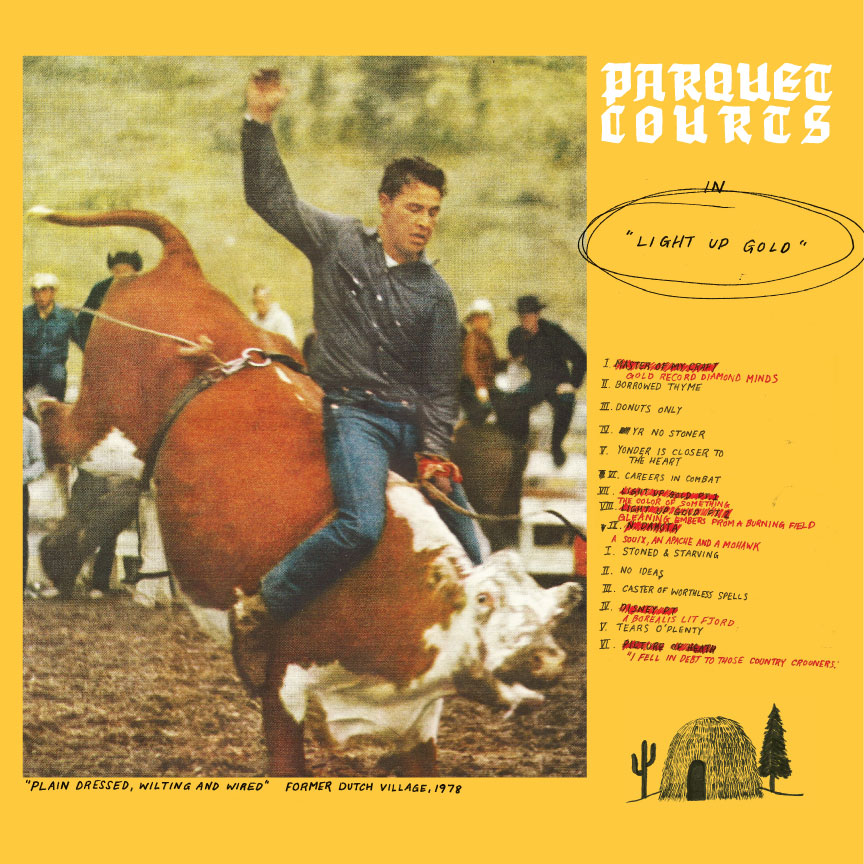Brevity and Rock N’ Roll have always gone hand in hand. Get in, get out. Say what you have to say and get the hell out of town. There are exceptions of course, quite a few in fact. And in recent years, it seems that more and more bands are shying away from this kind of laconic approach to music. This may explain why: when a band releases an album of lean, succinct rock, people seem to take more notice than if the band had taken their time and stretched out the songs to some indeterminable length (though there’s nothing wrong with that). The debut record from Parquet Courts seems to find a special, almost communal, bond with bands that treated this kind of concise rock as if it were holy writ. Channeling the spirit of The Stooges, The Dictators, and almost every other punk/post-punk band of the last 40 years, not to mention most recent indie rock artists, Light Up Gold feels revelatory in its simplicity.
But Parquet Courts are not merely the sum of their influences. They take what has worked since The Dictators released Go Girl Crazy! back in 1975 and spike the punch with a fistful of twisting, musical non-sequiturs. These guys hide a lot more than you might realize in their often terse, frenetic rock. It might not be a fair comparison (either way, depending on your preference), but Parquet Courts remind me a good deal of Ween. Both bands have obvious technical chops but purposefully hide them behind a veil of barely contained musical urges and adolescent affectation. Just as likely to crank out indie rock shorthand as they are to actually dig down deep into the genre, Parquet Courts nonetheless take every opportunity afforded them to rattle your eardrums and cause the inevitable bout of whiplash.
Trading on different vocal characteristics from such frontmen as Mark E. Smith and Jon King, singer/guitarist Andrew Savage rattles off his sing-song lyrics in an indignantly casual manner. Opening track “Master of My Craft” imagines New York in ’76, Poly Styrene sharing a drink with Joe Strummer while “Blitzkrieg Bop!” thumps out of the nearest jukebox. It possesses the kind of authentic swagger that The Strokes would sell their souls to have. The guitars sound overly elastic and reverbed, and Savage tears through his words with an almost religious fervor, barking about not coming here to “dream or teach the world things, define paradigms, or curate no livin’ days”. The hooky guitars on “Borrowed Time” play off the sense of 80’s post-punk delight that the band is clearly enamored with–Savage has some stronghold full of Gang of Four, Wire, and Pixies records somewhere. “Donuts Only” starts off with what sounds like the drum beat from “Billy Jean” but then launches full force into a distortion fueled cannon shot, with the band, bayonets in hand, charging into the smoke.
Parquet Courts carries this momentum through the rest of the record. Tracks like “Tears O’ Plenty” and “Light Up Gold II” owe more than a passing debt to Frank Black and his time apart from The Pixies, while “Picture of Health” sounds like a golden castaway from Mag Earwhig by Guided By Voices. You can feel Pollard’s influence smeared all over the echo-y vocals and fuzzed up guitars. But it’s not the easily recognizable musical touchstones that keep your attention. It’s the inherent respect and downright obsession for the bands that form the direct ancestry of Parquet Courts that keeps these songs sounding fresh and free of obvious mimicry. By tapping into this vein of classic punk/post-punk bands, Savage and his bandmates keep the album on an even keel, with just enough familiarity to breed trust but enough unexpected twists to leave your jaw nailed to the floor.
If there are a few missteps here, they are relatively minor. The meandering jam of “Stoned and Starving” and barely-there interstitial “Light Up Gold I” feel somewhat out of place on an album so dedicated to its own summary appetites. And I could have done with a bit more elaboration on “Disney P.T.” and “Careers In Combat,” if only because they’re so damn short. But that could just be me getting a bit crotchety in my old age. There’s always next time though, and if Light Up Gold is any indication, the guys in Parquet Courts are far from done tear-assing their way through New York of the late 70’s.
The album’s relative indie rock minimalism stands out in stark contrast to many other bands who feel that this kind of straightforward approach is either too uninteresting or too tied to certain years in music—I’m looking at you 1992—to even be considered as a viable option. What those bands fail to understand is that this kind of raucous musical misappropriation and subsequent adaptation can produce works of art on par with the best longform indie rock music. Two minutes is plenty of time to get the job done. And though about half of the songs here do push past that time limit, no song ever outstays its welcome, and each feels carried along by some inner, relentless momentum. If these songs ever stopped to catch their breaths, they would keel over from exhaustion, gasping like some dry-docked fish. But as long as they keep running and chugging along like a runaway freight train, they never seem to feel the fatigue that threatens to engulf them. With a middle finger tossed casually up for all to see, Parquet Courts surge toward the next horizon, reckless and hellbent, and I can’t imagine that they’d have it any other way.

